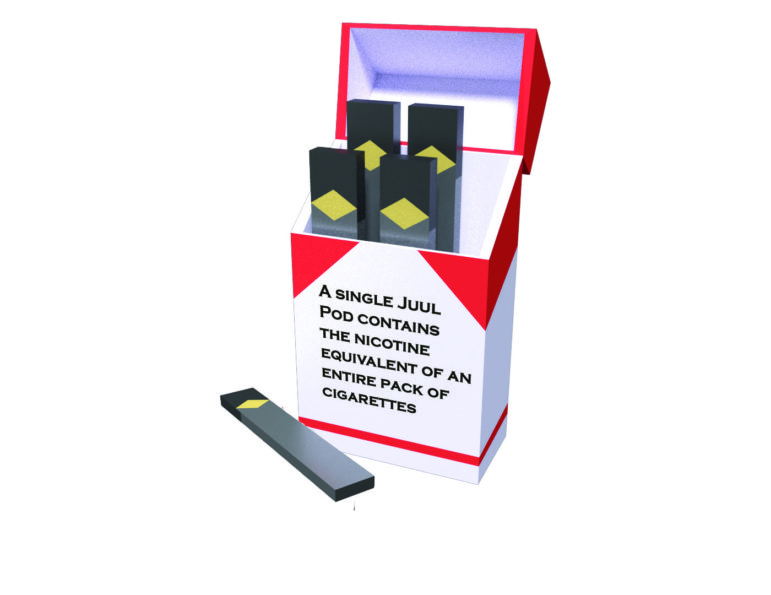
The Aragon administration hosted an informative meeting about vaping for parents and students on Oct. 17 to inform parents about the risks that vaping and substance abuse pose to high school students. Speakers included Assistant Principal Lisa Nagendran and School Resource Officer Laura Sharp.
The presentation focused on vaping at Aragon but also touched on the rising levels of chemicals such as tetrahydrocannabinol (THC) in products like edibles and vape pods that contain cannabis. The educational lecture was given to teachers and will be included in an assembly series for Aragon students in late November.
The presentation addressed national concerns from parents after the Food and Drug Administration (FDA) declared youth vaping an “epidemic.”
A 2017 survey from the National Institutes of Health found that 27.8 percent of high school seniors reported vaping in the last year, and over 2.1 million middle and high school students used e-cigarettes in 2017.
“There’s a lot of misperception that [vapes are] a safe product,” said Health teacher Justin Cottrell. “The biggest misperception of it is that when people … exhale from ingesting the aerosol, they think that [it’s] water vapor. And so [they think] it’s harmless.”
Despite the misleading name of “vapes,” e-cigarette liquids like a Juul pod contain a medley of benzoic acid, glycerol, propylene glycol, a variety of flavorings, and the nicotine equivalent of an entire pack of combustible cigarettes, according to Juul company.
“With cigarettes, the FDA makes sure there’s a requirement to how much nicotine can be contained the cigarette, they don’t have the same regulations for vaping,” Cottrell said. “I think a lot of people are [enticed] by the different types of flavors [in vape pods], which I think [the FDA is] trying to ban some of those flavors.”
The presentation warned parents of teenagers splicing phone cords to charge their Juuls and purchasing vape pens disguised as everyday objects like writing implements to disguise them from teachers. Administrators suggested that parents look out for missing cash that may have been spent on Juuls or Juul pods.
Sophomore Calan* has been vaping since his freshman year, and has done it in both bathrooms and classrooms on campus without being caught.
“I know there’s like chemicals in [vapes], stuff like that. There’s nicotine, and in the weed ones there’s THC,” he said. “I don’t think I [have an addiction] … I know there’s still bad sides to [vaping], but it’s better [than cigarettes,] I guess.”
Calan said he vapes both flavored juices and marijuana, which he purchases from other Aragon students.
“[They’re] my age and older,” Calan said.
Resource Officer Laura Sharp said the school mainly catches students vaping from tips or reports.
“It may be that they’re showing the effects of being under the influence, or somebody else reports seeing it,” Sharp said. “Or, it falls out of somebody’s pocket. That’s how we find them.”
Students who are caught with vape pens at school can face consequences like detention, suspension and mandatory educational sessions on the health effects of vaping. Severe or repeated cases face legal action, where a minor who possesses e-cigarettes or marijuana can be charged with an infraction or be fined.
Administration warned teachers to look out for students sharing food or candy that could contain THC, as well as to report students they believe are vaping to the office. They told parents that the school reserves the right to search students’ lockers if they have reason to believe that students are storing vape pens there.
Despite precautions, for Cottrell, it is rare to catch a student in the act.
“[I caught a student once] and they immediately fessed up and turned in their gear,” Cottrell said. “That was a couple of years ago, I think.”
Many adults fear nicotine addiction developed at a young age can lead to other forms of addiction in adulthood.
“There’s [59] milligrams of nicotine in a Juul cartridge, and if somebody smokes that in one sitting, they could be in a coma,” Cottrell said. “Nicotine is highly addictive. In the teen years, your brain is still developing … so when you’re ingesting a substance like nicotine, you’re training your brain to understand that [the substance is] helping you cope.”
As for the administration trying to cut down vaping, Nagendran said that the district office is testing devices similar to smoke alarms that are installed in bathrooms and alert administrators when it detects vapor; for now the devices are far too expensive to install in all the bathrooms.
*Name has been changed to preserve anonymity
